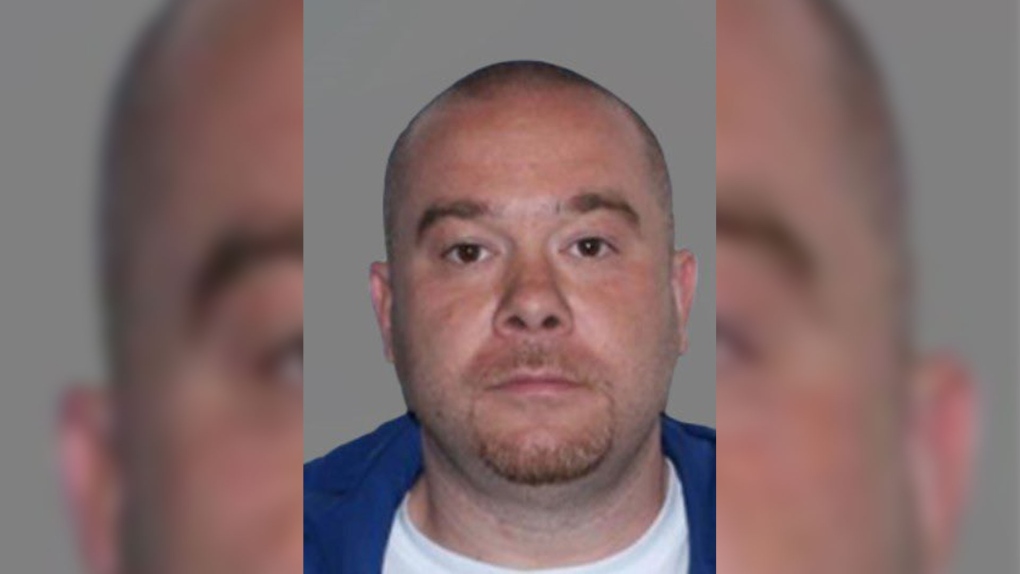Montreal police officer suspended without pay for 25 days after forging court document
 The logo of the Montreal police service Aug. 29, 2024. LA PRESSE CANADIENNE/Christinne Muschi
The logo of the Montreal police service Aug. 29, 2024. LA PRESSE CANADIENNE/Christinne Muschi
A Montreal police officer has been suspended for 25 days without pay after forging a court document in order to obtain information leading to the arrest of a high-profile killer in 2019.
Officer Guillaume Joly-Tessier used a stamp of a justice of the peace without her knowledge during a meeting in her office to authorize a warrant, according to a recent decision by Quebec's police ethics tribunal.
He requested it in 2019 during the SPVM's "Megalo II" operation aimed at arresting Frédérick Silva, a hitman wanted in connection with four murders and one attempted murder that spanned a 22-month period beginning on Feb. 21, 2017.
 Frederick Silva, one of Quebec's most wanted criminals, was arrested by police in Montreal, Que. (Montreal police)
Frederick Silva, one of Quebec's most wanted criminals, was arrested by police in Montreal, Que. (Montreal police)
An administrative judge condemned his actions, ruling that he violated the code of ethics that governs officers in the province.
"If we look only at the act committed, namely that of a police officer taking a judge's stamp without his permission while he was in her office, we can only be shocked and concerned for the integrity of the judicial process," wrote Justice Marc-Antoine Adam in his decision rendered last Friday.
Joly-Tessier must be "vigorously condemned in order to send an unequivocal message," the judgment reads.
Justice Adam wrote, however, that when taking into account the entire context of the situation, the seriousness of Joly-Tessier's actions are "considerably nuanced."
When the officer, who has now been on the force for 13 years, walked into the Montreal courthouse in 2019 and sat down with the justice of the peace, it was at a time when investigators were anxious to bring Silva to justice following the last murder, which happened in broad daylight in a public place in front of several people on Dec. 20, 2018.
During the meeting on Feb. 15, 2019, he requested she approve a "false judicial authorization" (FAJ) that he wanted to use to "verify the reliability of a third party" in order to secure Silva's arrest.
However, she refused, saying "such a document fell within the role of the police who, under section 25.1 of the Criminal Code, may be authorized to commit a criminal offence for investigative purposes," according to the decision.
When the justice of the peace temporarily left her office, the police officer grabbed the stamp and stamped the court document before leaving.
Silva was arrested one week later after being on a Canada-wide arrest warrant since June 2017. He was subsequently found guilty of the murders and attempted murder, and is currently serving a life sentence.
The administrative judge described how police were treating the Megalo II operation as a priority since Silva had access to sophisticated criminal resources that allowed him to evade the authorities for nearly two years.
"This explains in particular why, as SD Joly-Tessier confirmed at the hearing, the name and signature of a 'real' judge had to appear on the FAJ, so that the police’s scheme could not be unmasked," the ruling stated.
Both the prosecution and defence agreed on the 25-day suspension without pay for Joly-Tessier. His expression of regret, acknowledgment of his ethical violations, and low risk of reoffending were considered mitigating factors at his sentencing.
He has no prior police ethics decisions on his record.
When Silva was arrested, he was one of Quebec's 10 most wanted criminals. Now a hitman-turned-informant, information he provided to police led to several raids last year in the Montreal area in an effort to solve several homicides linked to the Montreal Mafia, Hells Angels and street gangs.
CTVNews.ca Top Stories

Aviation experts say Russia's air defence fire likely caused Azerbaijan plane crash as nation mourns
Aviation experts said Thursday that Russian air defence fire was likely responsible for the Azerbaijani plane crash the day before that killed 38 people and left all 29 survivors injured.
Police identify victim of Christmas Day homicide in Hintonburg, charge suspect
The Ottawa Police Service says the victim who had been killed on Christmas Day in Hintonburg has been identified.
Teen actor Hudson Meek, who appeared in 'Baby Driver,' dies after falling from moving vehicle
Hudson Meek, the 16-year-old actor who appeared in 'Baby Driver,' died last week after falling from a moving vehicle in Vestavia Hills, Alabama, according to CNN affiliate WVTM.
Boxing Day in Canada: Small retailers fear big shopping day won't make up for tough year
It’s one of the busiest shopping days of the year: Boxing Day sees thousands of people head to malls and big box stores to find great deals. But it's not so simple for smaller shops.
Raised in Sask. after his family fled Hungary, this man spent decades spying on communists for the RCMP
As a Communist Party member in Calgary in the early 1940s, Frank Hadesbeck performed clerical work at the party office, printed leaflets and sold books.
Sinkhole prompts lane closures on Interstate 80 in New Jersey
A sinkhole that opened up Thursday along Interstate 80 in northern New Jersey forced authorities to close the heavily travelled highway's eastbound lanes.
Police in New Brunswick investigating Christmas Eve sudden death
An unconscious individual was found in the 600-block area of Lancaster Avenue early Christmas Eve morning, and was later pronounced dead at a hospital.
Spending the holiday season alone this year? How to make the most of it
Spending the holidays alone can feel lonely or empty, but it doesn't have to be that way.
Finland stops Russia-linked vessel over damaged undersea power cable in Baltic Sea
Finnish authorities detained a ship linked to neighboring Russia as they investigate whether it damaged a Baltic Sea power cable and several data cables, police said, in the latest incident involving disruption of key infrastructure.
































